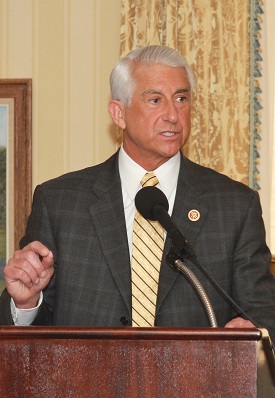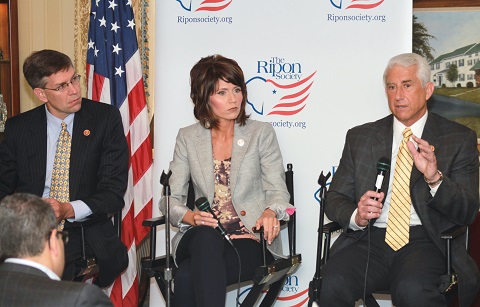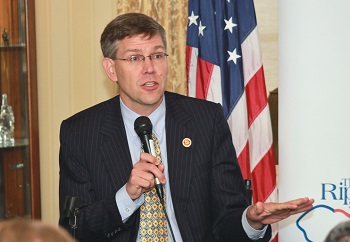Reichert, Paulsen and Noem discuss the growing epidemic of human trafficking and the effort they are leading in Congress to fight this problem here at home

WASHINGTON, DC – The Chairman of the Ways and Means Subcommittee on Human Resources, Rep. Dave Reichert (WA-8), appeared before a breakfast meeting of The Ripon Society this past Thursday morning to discuss the growing epidemic of human trafficking and the effort in Congress to fight this problem here at home. He was joined by fellow Reps. Erik Paulsen (MN-3) and Kristi Noem (SD-AL), who, along with Reichert, are leaders in this fight and members of a new anti-trafficking task force that House Republicans established earlier this year.
The breakfast followed up on the unanimous passage of the Preventing Sex Trafficking of Youth in Foster Care Act by the Ways and Means Committee last Tuesday. Reichert, who has over three decades of experience as a law enforcement officer and is the author of the legislation, opened his remarks by explaining why he believes it is so important to protect at-risk children and why it is critical for Congress to pass this bill. “I look at my life as a runaway living on the street,” Reichert stated, recalling his own difficult childhood. “I understand why kids leave and what they’re looking for, how confused they are, and how lonely they are. It’s our responsibility to be the ones to step up and protect these kids.”
According to Reichert, the Preventing Sex Trafficking of Youth in Foster Care Act is bipartisan legislation that would ensure States are taking the proper steps to keep foster youth safe, help them lead happy, normal lives and stay off the streets to prevent them from becoming victims of sex trafficking. It would also help identify victims and the services they need to get them out of their situation and successfully rehabilitated into society. The National Center for Missing and Exploited Children reports that 59% of suspected juvenile sex trafficking victims were in foster care or group homes before they ran away. This bill takes important steps to change these troubling statistics and prevent youth victimization.

“In the foster care system, even as far back as the ‘80s,” Reichert explained, in response to a question, “these kids move from home to home to home. Some of them age out of foster care. Some of them never have a permanent home. They have nowhere to go for Christmas or Easter or Thanksgiving. The bill we passed this week gives some direction and sets some standards for states to collect information and data around the young women or girls who are getting into trafficking, where are they from, and the services we need to focus on that can help.”
Reichert served as King County Sheriff prior to his election to Congress in 2004 and rose to national prominence as head of the task force that caught the Green River Killer. He talked about the serial killer in his remarks, and some of the young girls who lost their lives in this horrific series of crimes.
“He chose victims who were vulnerable,” stated the former Sheriff. “Victims who ran away from home, who, in some cases, were never even reported missing. We found a body that was six years old – never even reported. For six years, she lay dead in a shallow grave south of Seattle. We finally identified and traced her back to her family. They had just given up. They were done reporting her as a missing person. They quit caring. We cannot quit caring. All of these girls did not come from homes that were violent. They came from good homes. They came from families in your community, and they just got caught up with the wrong person, the wrong group. They ended up on the street, and before they knew it, they got sucked into a lifestyle and they couldn’t get out alone.”

Paulsen, who also serves with Reichert on the Ways and Means Committee, echoed his colleague’s remarks and explained how hard this problem has hit his home state.
“I spent a little bit of time in Minnesota riding along with the police,” stated Paulsen. “I have four daughters myself, and it quickly became apparent that there’s a real issue with sex trafficking. A lot of people think this is an issue that only happens in far away countries and not in the United States. The truth is it’s happening in our own backyards. It’s happening in the suburbs with recruitment going on in malls and libraries. I’ve had a chance to meet with a lot of victims’ groups and organizations that have provided support for some of these young girls. And they are girls – the average age is 13 years old when they’re thrown in the trafficking system and wind up becoming a prostitute.”
“In Minnesota, we are the number one state per capita for the number of runaways in the country. Fifty percent of runaways become prostitutes, and our law enforcement officials say they are by far the vast majority of people who end up trapped in the sex trafficking system. These are essentially young girls who should be treated as victims, get the services they need, and come back out of the shadows, if you will … I think this awareness of sex trafficking and human trafficking is a lot like where domestic violence was decades ago. That’s the level we’re at, and we have the ability to raise the awareness.”

Noem agreed.
“I didn’t realize sex traffickers were targeting kids while they’re at school or in the mall until probably about a year ago,” said Rep. Noem. “I have two teenage daughters. I never realized that, as I sent my daughters out the door every morning, they could potentially be trafficked.” In response to a question after her remarks, Noem stressed the importance of not just raising awareness of human trafficking, but of taking concrete legislative steps to bring this epidemic to an end, as well. “My dad raised me that if you don’t like something, just fix it — don’t complain about it,” she remarked. “A lot of times, what we do in Washington is we talk. I don’t see the value very much in just talking about this issue. I want to pass bills, throw these people in jail, save the kids, and do all that we can.”
The Ripon Society is a public policy organization that was founded in 1962 and takes its name from the town where the Republican Party was born in 1854 – Ripon, Wisconsin. One of the main goals of The Ripon Society is to promote the ideas and principles that have made America great and contributed to the GOP’s success. These ideas include keeping our nation secure, keeping taxes low and having a federal government that is smaller, smarter and more accountable to the people.



